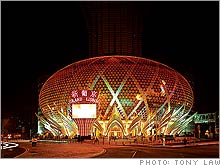Macau nowAs a new wave of over-the-top resorts hits the gambling kingdom, Fortune senior writer Clay Chandler explores the Vegas of Asia.(Fortune Magazine) -- Hunter S. Thompson would have found much to fear and loathe in Macau, the former Portuguese colony rebranding itself as a gambling paradise. The good doctor (rest his soul) would have been vexed to discover that Macau, surrounded by water and crowded immigration checkpoints, is best entered by ferry, not gas-guzzling Caddy. No doubt he'd have been dismayed to learn that since Macau's 1999 return to Chinese rule, hallucinogenic substances aren't easily procured. But then again, when you can gaze at the Grand Lisboa casino, the newly built neon orb that throbs and pulses at the edge of the Macau peninsula like the Technicolor egg of some gargantuan radioactive monster, who really needs peyote? Indeed, Western gamblers looking for something more exotic than Reno or the Riviera are in for a bit of a shock when they arrive in this smog-shrouded enclave. In Macau's city center, the pastel fa�ades of Senado Square and the ruins of St. Paul's cathedral evoke Macau's four centuries under Portuguese rule. But the frenzy of development elsewhere lends this Old World city the feeling of a frontier boomtown (albeit a relatively sober one: Macau's hard-core gamblers prefer tea to liquor).
While Macau is now the world's gaming capital last year revenue surged 22%, to $7 billion, vaulting the city ahead of Vegas - there are just a few decent restaurants and not much in the way of shopping or shows to speak of (yet). Still, Macau is a fascinating place to watch some of the most intense gambling around, both at the baccarat tables and amid vast, dusty construction sites, where high-rolling developers are betting billions. The island was closed to all foreign competitors till 2002, when Beijing stripped local tycoon Stanley Ho of his monopoly over the island's gambling concession, which he had held for 40 years. Faced with new competition, Ho (who also controls the lottery, dog and horse racing, the ferry and helicopter terminals, and the city's largest land bank) rushed to gussy up some aging properties and build new ones. On a recent visit to his newest, the Grand Lisboa, a troupe of Russian street players performed slapstick routines beneath crystal chandeliers in the front lobby, while on the gambling floor upstairs, a trio of cabaret dancers shimmied in front of a giant oval of orange jade. Ho's offspring have also benefited from the boom: His son Lawrence partnered with James Packer, Australia's richest man, and in May they opened the $500 million Crown Macau on the island of Taipa. MGM Mirage (Charts, Fortune 500), owner of Las Vegas's Mirage and Bellagio casinos, has teamed with Ho's daughter Pansy to build a 28-story, 600-room hotel and casino set to open later this year on the waterfront. Vegas entrepreneur Sheldon Adelson, however, is making the biggest wager that visitors here will want to do more than just gamble. After recouping his $240 million investment in the Sands Macau in just eight months (the cavernous casino set the world record for the largest number of gaming tables under one roof), he's getting ready to throw open the doors of another Vegas outpost, the $2.2 billion Venetian Macau, on Aug. 28. The Venetian is the first phase of a truly mammoth complex slated for completion next year, which will include 20,000 rooms operated by five luxury hotel chains such as Four Seasons and Raffles. This so-called Cotai Strip (named for a bit of reclaimed land between the islands of Coloane and Taipa) will feature hundreds of yet-to-be-named restaurants and boutiques; a labyrinth of exhibit halls, performance stages, and conference rooms; and three Venetian-style canals plied by authentic Italian gondolas. The whole shebang will be sheathed in an air-conditioned biodome. Around the perimeter of Adelson's complex, Packer and Lawrence Ho have begun construction of City of Dreams, a giant casino and underwater theme park. Nearby, another group is building Macau Studio City, a casino-cum-multimedia-center that will include a boutique hotel designed by Shanghai Tang founder David Tang. There is, however, one party that wants to hedge its bets: Recently authorities in neighboring Guangdong province sharply curtailed the number of new visas granted to tourists from the mainland, possibly under pressure from Chinese authorities to curb speculative excess. The move prompted Steve Wynn, who opened the swank Wynn (Charts) Macau last year, to announce he was scaling back expansion plans. Should the government crack down, soon foreigners will have another Asian Vegas to visit: Singapore's government has scrapped its long-standing ban on gambling and has struck deals for two multibillion-dollar hotel/casino developments, one with Adelson near the financial district and another with Malaysia's Genting International on Sentosa Island, a beach resort just off the coast. Singapore is hoping to differentiate itself from Macau by promising to maintain a clean image, and to that end it recently forced Genting to sever ties with Stanley Ho, with whom the group had planned to partner. Sin City without any sin at all? We can only imagine what Dr. Thompson would have to say about that. From the July 9, 2007 issue
|
Sponsors
|

